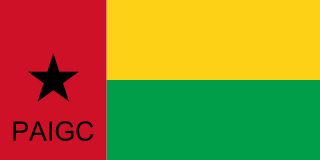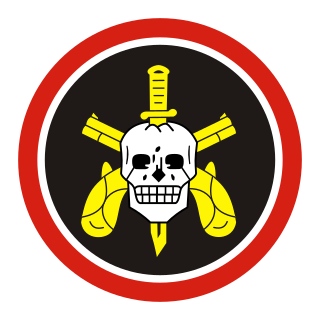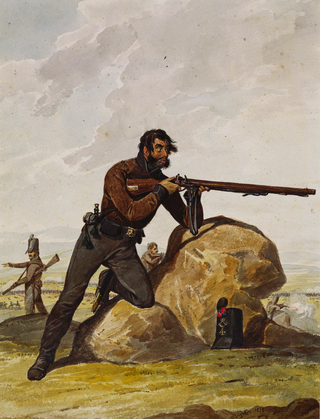
The Angolan War of Independence, known as the Armed Struggle of National Liberation in Angola, was a war of independence fought between the Angolan nationalist forces of the MPLA, UNITA and FNLA, and Portugal. It began as an uprising by Angolans against the Portuguese imposition of forced cultivation of only cotton as a commodity crop. As the resistance spread against colonial authorities, multiple factions developed that struggled for control of Portugal's overseas province of Angola. There were three nationalist movements and also a separatist movement.

The Revolutionary Armed Forces of the People were originally the armed wing of the African Party for the Independence of Guinea and Cape Verde during the struggle against Portuguese rule in Guinea-Bissau and Cape Verde. Since 1973, they constitute the national armed forces of Guinea-Bissau. A separate Cape Verdean branch of the FARP constituted the national armed forces of this country from 1975 until the early 1990s, when these were renamed "Cape Verdean Armed Forces".

The Portuguese Colonial War, also known in Portugal as the Overseas War or in the former colonies as the War of Liberation, and also known as the Angolan, Guinea-Bissau and Mozambican War of Independence, was a 13-year-long conflict fought between Portugal's military and the emerging nationalist movements in Portugal's African colonies between 1961 and 1974. The Portuguese regime at the time, the Estado Novo, was overthrown by a military coup in 1974, and the change in government brought the conflict to an end. The war was a decisive ideological struggle in Lusophone Africa, surrounding nations, and mainland Portugal.

Macau was under Portuguese rule from 1557 until 1999. During the final period of colonial administration prior to the handover of Macau to China, Portugal retained only limited numbers of military personnel in Macau for liaison and support purposes; the last major units having been withdrawn following the Carnation Revolution of 1974.
The CTOE - Centro de Tropas de Operações Especiais, based in Lamego, is a unit of the Portuguese Army with the mission of instructing troops in unconventional warfare and counter-terrorism. Until 2006, it was known as CIOE - Centro de Instrução de Operações Especiais.
The government of Macau confers honors every year in the form of decorations, medals and honorary titles.

Batalhão de Operações Policiais Especiais (BOPE) is the tactical police unit and gendarmerie of the Military Police of Rio de Janeiro State (PMERJ) in Brazil. Due to the nature of crime in favelas, BOPE units utilize equipment deemed more powerful than traditional civilian law enforcement, and have extensive experience in urban warfare as well as progression in confined and restricted environments.

José António Marques was the founder of the Portuguese Red Cross.
Portugal has a system of orders, decorations, and medals as a means of honouring individuals for personal bravery, achievement, or service to Portugal.
The Northeastern Military Command is one of the eight Military Commands of the Brazilian Army. The Northeastern Military Command is responsible for the defense of the states Bahia, Sergipe, Rio Grande do Norte, Paraíba, Pernambuco, Alagoas, Ceará, Piauí, and Maranhão. Three Military Regional Commands are subordinated to the CMNE for administrative purposes.
The Planalto Military Command is one of the eight Military Commands of the Brazilian Army. The Planalto Military Command is responsible for the defense of the state Goiás, most of the state of Tocantins, the Federal District with the capital Brasília, and the Triângulo Mineiro region of the state of Minas Gerais.
Nambuangongo is a municipality in the Bengo Province of Angola, with its seat in the city of Muxaluando.

Paulo Bénard Guedes was the 127th Governor-General of Portuguese India. He was also a general of the Portuguese army.

The Caçadores (hunters) were the elite light infantry troops of the Portuguese Army, in the late 18th and early 19th centuries. Units of Caçadores – with features somewhat different from the original ones – continued to exist in the Portuguese Armed Forces until the 1970s, namely the Caçadores Especiais – several special forces companies of the Portuguese Army created by the Special Operations Troops Centre at the beginning of the 1960s and heavily employed throughout the Portuguese Colonial War (1961-1974) in Africa.
The Cheche Disaster was an incident during the Portuguese Colonial War in Portuguese Guinea in which almost fifty Portuguese soldiers died on 6 February 1969 while crossing the Corubal River.
Alcora Exercise or simply Alcora was a secret military alliance of South Africa, Portugal, and Rhodesia, formally in force between 1970 and 1974. The code name "Alcora" being an acronym for "Aliança Contra as Rebeliões em Africa".

Battalion of Special Police Operations is a special operations force of the Military Police of the State of Acre (PMAC), directly subordinated to the General Command.The BOPE of the Military Police of Acre, is the Specialized Unit of the State to intervene in critical events involving hostage rescue, rural operations, shock operations and other specific missions. In addition to being the creator, diffuser and maintainer of all operational doctrine of the local military police, it is the troop created and maintained to provide operational support to the other PMAC Units, being, therefore, the last one in the escalation of force to the convenience of employment by the High Command Rank of the Corporation.

The Military Medal of the War Cross was created by Decree No. 2870, of 30 November 1916, to award acts and feats of bravery performed in the campaign. This decoration received notoriety during World War I and during the Portuguese Colonial War . The Cruz de Guerra is the third highest Portuguese military decoration, ranking just after the Ordem Militar da Torre e Espada and the Medal of Military Valor, and being superior to the Orders of Christ, Avis and Sant'Iago da Espada e other military and civil decorations.
 Military Valor Medal (Silver with Palm) (MPVM) [a] ( Portugal )
Military Valor Medal (Silver with Palm) (MPVM) [a] ( Portugal ) 







